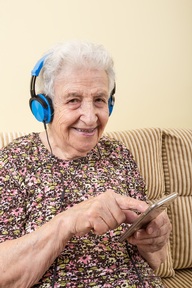Charity calls for music therapy to be available on prescription for people with dementia

ENRICHEnabling Research in Care Homes
NEWS ARCHIVE
Charity calls for music therapy to be available on prescription for people with dementia
www.carehome.co.uk
At the launch of its report, Music Reawakening, the charity Arts 4 Dementia, urged doctors to integrate music therapy into the Dementia Care Pathway, which is the support and care given to people with dementia by health and social care.


At the launch of its report, Music Reawakening, the charity Arts 4 Dementia, urged doctors to integrate music therapy into the Dementia Care Pathway, which is the support and care given to people with dementia by health and social care.
Dr Trish Vella-Burrows, deputy director and arts and dementia lead for the Sidney De Haan Research Centre for Arts and Health said: ‚ÄúI have seen it so many times. There are ‘shouters’ so we give them something to calm them down. There are ‘wanderers’ so we give them something to stop them wandering. I want to integrate music therapy into care pathways. We have a vision where music therapy will be available on prescription.‚Äù
Music has been credited with slowing cognitive decline, with Veronica Franklin Gould, founder of Arts 4 Dementia, calling it a “visceral language more profound than words” which can “bypass symptoms of dementia, reach deep emotions to stimulate though processes and enable speech”.
The charity’s decision to do a report into the impact of music on dementia was prompted by Arts 4 Dementia participants in music projects who remained symptom free for days afterwards, but also because of a violinist with dementia who played fluently with the Philharmonic Orchestra.
Arts 4 Dementia would like to see people when they receive a diagnosis of dementia being directed at the same time, to musical interventions such as cognitive rehabilitation and reablement through joining an orchestra or a choir.
Ms Franklin Gould originally set up Arts 4 Dementia, after her mother who had Alzheimer’s was visited by a talented Russian cellist. The musician played Bach’s first cello suite to her mother and Ms Franklin Gould found there was a ‚Äúdramatic, albeit brief, return of her communication skills‚Äù.
Dr Charles Alessi, a senior advisor to Public Health England, who was also at the launch of the report, would like to see health professionals being given more training on the benefit of music therapy.
 He said: ‚ÄúMusic therapy is important and there is no reason why it shouldn’t be included in the management of people with dementia. The carer would also get the benefit of this.
He said: ‚ÄúMusic therapy is important and there is no reason why it shouldn’t be included in the management of people with dementia. The carer would also get the benefit of this.
‚ÄúIt is difficult to get music therapy to be a part of people’s care pathways and a lot of the prejudice against music therapy comes from people like me, people of my ilk – clinicians. I think there is something wrong with the way we train people.‚Äù
He added: “It is all very well caring for the body but we are not just body parts. The arts feed the self in a way that nothing else does.”
The report looks at various projects this year that have re-energised people with dementia through the power of music. These have ranged from musicians with dementia continuing to perform with an orchestra to choral groups which encourage communication and can help preserve speech plus opera workshops on a canal.
Baroness Sally Greengross, chief executive of the International Longevity Centre – UK, also attended the launch event.
She said: “People with dementia feel a lot of anger and frustration. If you emotionally involve someone with dementia through music you can dissolve the anger.”
She also spoke of her pride in Britain for the work it has done raising awareness of dementia.
“I have been very proud of coming from this country as our prime minister got the leaders of the industrialised countries to come together and discuss dementia. He chose dementia as the huge challenge that we all face. We have a Conservative Government that is worried about the economy so the fact that they put in the amount of money they did is good. We have even got a dementia-friendly Parliament now.
“We have to make sure everyone in this country is aware of dementia. We need to join in this fight to make sure life is good for people and their carers with dementia. We may be one of these people one day.”
To find out more about Arts 4 Dementia go to http://www.arts4dementia.org.uk